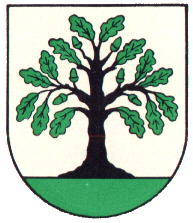Sandweier: Difference between revisions
Jump to navigation
Jump to search
Knorrepoes (talk | contribs) m (Text replacement - "/Arms of " to "/Arms (crest) of ") |
Knorrepoes (talk | contribs) m (Text replacement - "{{media}}" to " {{de1}} {{media1}}") |
||
| Line 22: | Line 22: | ||
The oldest known seal of the village dates from the 1820s and shows in a crowned shield the letter S. The local council applied in 1900 for new arms. They preferred to have a hare in the arms, as the nickname of the villagers was Sandhasen (sand-hares). The State-Archives proposed several arms, but the council did not like the proposals. Finally the above arms were proposed, which symbolise the many oak forests that used to be in the area. The arms were adopted in July 1903. | The oldest known seal of the village dates from the 1820s and shows in a crowned shield the letter S. The local council applied in 1900 for new arms. They preferred to have a hare in the arms, as the nickname of the villagers was Sandhasen (sand-hares). The State-Archives proposed several arms, but the council did not like the proposals. Finally the above arms were proposed, which symbolise the many oak forests that used to be in the area. The arms were adopted in July 1903. | ||
{{ | |||
{{de1}} | |||
{{media1}} | |||
[[Civic Heraldry Literature - Germany|'''Literature''']]: Zier and Futterer, 1966. | [[Civic Heraldry Literature - Germany|'''Literature''']]: Zier and Futterer, 1966. | ||
Revision as of 11:47, 26 December 2022
This page is part of the German heraldry portal |
Heraldry of the World |
|
German heraldry:
|
Selected collector's items from Germany:
|
SANDWEIER
State : Baden-Württemberg
District (Kreis) : Baden-Baden (until 1972 Rastatt)
Incorporated into : 1975 Baden-Baden
| German | |
| English | No blazon/translation known. Please click here to send your (heraldic !) blazon or translation |
Origin/meaning
The oldest known seal of the village dates from the 1820s and shows in a crowned shield the letter S. The local council applied in 1900 for new arms. They preferred to have a hare in the arms, as the nickname of the villagers was Sandhasen (sand-hares). The State-Archives proposed several arms, but the council did not like the proposals. Finally the above arms were proposed, which symbolise the many oak forests that used to be in the area. The arms were adopted in July 1903.
Literature: Zier and Futterer, 1966.


